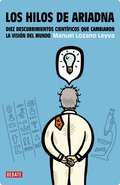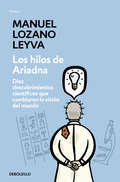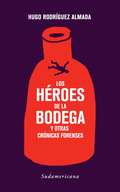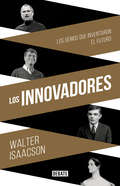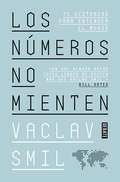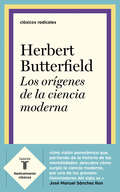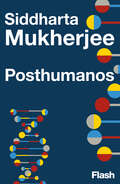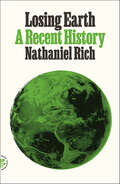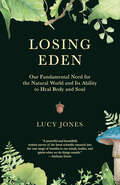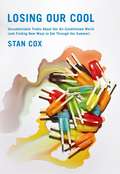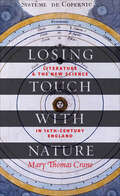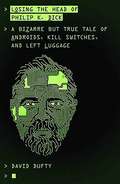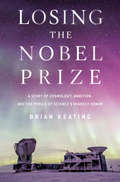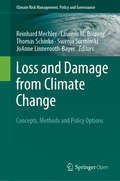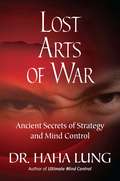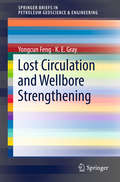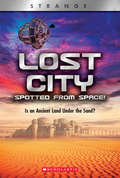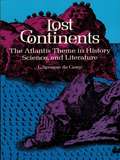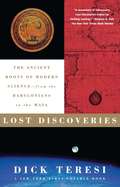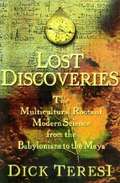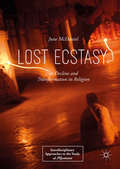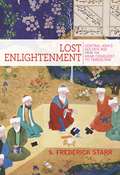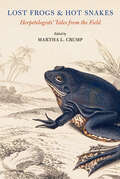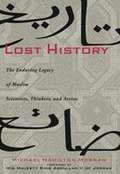- Table View
- List View
Los hilos de Ariadna
by Manuel Lozano LeyvaLa ciencia es un universo fascinante lleno de sorpresas. Un territorio donde reina la aventura del conocimiento y los descubrimientos constituyen pilares esenciales para el progreso humano. Este es el hilo conductor que guía al profesor Lozano Leyva -uno de los físicos más prestigiosos del país- en su afán por acercarnos diez hallazgos científi cos de la historia con un lenguaje accesible y lleno de guiños inteligentes. De la posibilidad de vida extraterrestre tomando como principio las condiciones que facilitaron la vida en la Tierra a las estrellas y su movimiento; de la piedra Rosetta -aquella que la expedición napoleónica encontró en Egipto y cuyos jeroglíficos descifró Champollion- a la colección de microscopios de Van Leeuwenhoek, esencial para el avance de la medicina; de la genética moderna a la sorprendente historia del «cero» y su influencia en la psicología, el arte, la matemática y la fi losofía, Lozano Leyva ha escrito un libro apasionante, lleno de ideas y sugerencias que hará las delicias de cualquier aficionado a la ciencia y sus misterios.
Los hilos de Ariadna: Diez descubrimientos científicos que cambiaron la visión del mundo
by Manuel Lozano LeyvaLos diez descubrimientos científicos que cambiaron la visión del mundo. La ciencia es un universo fascinante lleno de sorpresas. Un territorio donde reina la aventura del conocimiento y los descubrimientos constituyen pilares esenciales para el progreso humano. Este es el hilo conductor que guía al profesor Lozano Leyva -uno de los físicos más prestigiosos del país- en su afán por acercarnos diez hallazgos científicos de la historia con un lenguaje accesible y lleno de guiños inteligentes. De la posibilidad de vida extraterrestre tomando como principio las condiciones que facilitaron la vida en la Tierra a las estrellas y su movimiento; de la piedra Rosetta -aquella que la expedición napoleónica encontró en Egipto y cuyos jeroglíficos descifró Champollion- a la colección de microscopios de Van Leeuwenhoek, esencial para el avance de la medicina; de la genética moderna a la sorprendente historia del "cero" y su influencia en la psicología, el arte, la matemática y la filosofía, Lozano Leyva ha escrito un libro apasionante, lleno de ideas y sugerencias que hará las delicias de cualquier aficionado a la ciencia y sus misterios. Reseña:«Lozano Leyva ha escrito un libro entretenido y de lenguaje claro que ayuda a acercarse a la ciencia.»Santiago Belausteguigoitia, El País
Los héroes de la bodega y otras crónicas forenses
by Hugo Rodríguez AlmadaA lo largo de once intensas historias de muertes violentas el médico Hugo Rodríguez cuenta su experiencia como forense.En estas muertes el escritor-médico médico-escritor reflexiona sobre la vida, la muerte, la pobreza, la violencia y el ser humano. Un texto potente para leerlo en distintos niveles. El escritor y grado 5 en Medicina Legal Hugo Rodríguez Almada convive con la muerte y la tragedia, es su trabajo. A lo largo de veinticinco años de ejercicio de la profesión, este escritor-médico ha lidiado con casos donde el papel principal no lo tiene la muerte, lo tiene el contexto. La pobreza, la violencia de género, el egoísmo y la sociedad son algunos de los personajes principales que sobrevuelan estas historias particulares y comunes. Cinco años después de haber publicado Crónicas forenses. Historias de personas, el autor se propone «reivindicar la Medicina Legal y las Ciencias Forenses, igualmente maltratadas por la práctica tolerada del intrusismo y de los vendedores de humo. Rescatarlas de la mentira, tantas veces festejada por la credulidad del público y siempre funcional al sistema, para colocarlas en el lugar cierto de lo inexacto, lo incompleto y lo falible». Y también «contar historias que, por alguna razón, se quedaron en mí. Y que, a la vez, me parece de utilidad social darlas a conocer, desvistiéndolas, hasta donde sea posible, de lo críptico y las jergas técnicas». Con gran sentido narrativo y documentado, conoceremos qué hay detrás de once casos que muestran al ser humano, la muerte y la vida.
Los innovadores: Los genios que inventaron el futuro
by Walter IsaacsonEn una era que busca fomentar la innovación, la creatividad y el trabajo en equipo, Los innovadores es la obra que mejor muestra cómo se producen. Tras su extraordinaria biografía de Steve Jobs, el nuevo libro de Walter Isaacson cuenta la fascinante historia de las personas que inventaron el ordenador e internet; Los innovadores está destinado a convertirse en la historia definitiva de la revolución digital y en una guía indispensable para entender cómo sucede realmente la innovación. ¿Qué talentos y habilidades permitieron a algunos inventores y empresarios convertir sus ideas visionarias en realidades disruptivas? ¿De dónde vinieron esos saltos creativos? ¿Por qué algunos triunfaron y otros fracasaron? En esta magistral saga, Isaacson arranca con Ada Lovelace, la hija de lord Byron, una pionera de la programación informática en la década de 1840. Además, presenta a las extraordinarias personas quecrearon la revolución digital que nos rodea, gente como Vannevar Bush, Alan Turing, John von Neumann, J.C.R. Licklider, Doug Engelbart, Robert Noyce, Bill Gates, Steve Wozniak, Steve Jobs, Tim Berners-Lee o Larry Page. Esta es la historia de cómo funcionan sus cerebros y por qué han sido tan inventivos, pero también de cómo su capacidad para colaborar y dominar el arte del trabajo en equipo les hizo aún más creativos.
Los números no mienten: 71 historias para entender el mundo
by Vaclav SmilUn maestro de los datos y las estadísticas ofrece una visión del mundo tan sorprendente como iluminadora. ¿Es peligroso volar? ¿Qué es peor para el medioambiente, un coche o un móvil? ¿Cuánto pesan todas las vacas del mundo juntos y por qué ese dato importa? ¿Se puede medir la felicidad? La misión de Vaclav Smil es convencernos de que los hechos importan. Científico medioambiental, analista de políticas públicas y autor tremendamente prolífico, es el referente de Bill Gates cuando se trata de entender el mundo. En Los números no mienten, nos embarcamos con Smil en una fascinante expedición en busca de datos que desafían nuestras preconcepciones, al tiempo que nos invita a ver con nuevos ojos el impacto de las transformaciones del mundo moderno sobre la sociedad y el medioambiente. Basado en divertidos ejemplos, estadísticas y gráficas asombrosas, este libro es la combinación perfecta de ingenio, historia y ciencia quecambiará la manera en que vemos el mundo. Es posible que los números no mientan, pero ¿qué verdad transmiten? La crítica ha dicho...«El título de Smil lo dice todo: para entender el mundo hay que examinar las líneas de tendencia, no los titulares. Un retrato fascinante, convincente y sobre todo realista del mundo actual y de hacía dónde nos dirigimos.»Steven Pinker «La palabra "erudito" se inventó para describir a gente como él.»Bill Gates «Uno de los pensadores más importantes del mundo sobre la historia del desarrollo y un maestro del análisis estadístico.»The Guardian
Los orígenes de la ciencia moderna
by Herbert ButterfieldUn viaje a la Revolución científica, uno de los momentos más fascinantes de la historia de nuestra cultura. No hay nada más radical que un clásico. Los orígenes de la ciencia moderna es el maravilloso relato de cómo las grandes ideas científicas penetraron en el seno de la sociedad hasta transformar radicalmente el pensamiento occidental. La Revolución científica supuso un cambio de paradigma al romper con el mundo antiguo y medieval no solo en lo referente a la ciencia sino también en el resto de disciplinas. Este libro, esencial para entender la irrupción de la ciencia en el mapa mental de la humanidad, nos recuerda que la idea del método científico, hoy tan asentada, fue una lección difícil de aprender. ---------------------------------- radical: adj. Perteneciente o relativo a la raíz. Clásicos Radicales nace con la misión de recuperar algunos de los libros más emblemáticos del sello que en su día formularon una idea nueva u ofrecieron una mirada original y pertinente sobre las grandes cuestiones universales. Ausentes de las librerías durante demasiado tiempo pero recordados y buscados por los lectores más despiertos, estos textos esenciales de disciplinas como la filosofía, la ética, la historia, la sociología, la economía, la antropología, la psicología y la política mantienen su plena vigencia y vuelven hoy con fuerza para iluminar nuestro presente. ------------- Reseña:«Una visión panorámica que, partiendo de la historia de las mentalidades, descubre cómo surgió la ciencia moderna, por uno de los grandes historiadores del siglo xx.»José Manuel Sánchez Ron
Los posthumanos
by Siddhartha Mukherjee¿Qué pasará cuando dominemos completamente nuestro genoma? ¿Podremos crear, en nombre de la ciencia, posthumanos capaces de superar las enfermedades que nos asolan en la actualidad? Siddhartha Mukherjee, ganador del Premio Pulitzer por El emperador de todos los males, nos ofrece una detallada visión de lo que puede a llegar a convertirse la raza humana si es que, en el futuro, todavía podemos llamarla así. Sobre El gen:«Esta quizá sea la mejor historia de suspense jamás contada, una búsqueda de milenios dirigida por mil exploradores, de Aristóteles a Mendel a Francis Collins, tras el enigma en el centro de cada célula. Como El emperador de todos los males, El gen es prodigiosa, torrencial y finalmente transcendente. Si te interesa en qué consiste ser humano hoy y en todos los mañanas que vengan, tienes que leer este libro.»Anthony Doerr, autor de La luz que no puedes ver «El gen es una magnífica síntesis de la ciencia de la vida, y nos obliga a enfrentarnos con el núcleo de esa ciencia, así como con los retos éticos y filosóficos a nuestra idea de en qué consiste ser humano.»Paul Berg, Premio Nobel de Química «Magnífico... La historia del gen se ha contado por trozos de distintas maneras, pero nunca con la perspectiva y la grandeza que Mukherjee aporta a su historia.»James Gleick, New York Times Book Review
Losing Earth: A Recent History
by Nathaniel RichA Vanity Fair Best Book of the Year: “Gripping . . . revelatory . . . Climate change is a tragedy, but Rich makes clear that it is also a crime.” —The New York Times Book ReviewFinalist, PEN/E.O. Wilson Literary Science Writing AwardBy 1979, we knew nearly everything we understand today about climate change—including how to stop it. Over the next decade, a handful of scientists, politicians, and strategists, led by two unlikely heroes, risked their careers in a desperate, escalating campaign to convince the world to act before it was too late. Losing Earth is their story, and ours.The New York Times Magazine devoted an entire issue to Nathaniel Rich’s groundbreaking chronicle of that decade, which became an instant journalistic phenomenon sparking coverage and conversations around the world. Emphasizing the lives of those who grappled with the great existential threat of our age, it made vivid the moral dimensions of our shared plight.Now expanded into book form, Losing Earth tells the human story of climate change in even richer, more intimate terms. It reveals, in previously unreported detail, the birth of climate denialism and the genesis of the fossil fuel industry’s coordinated effort to thwart climate policy through misinformation, propaganda, and political influence. The book carries the story into the present day, wrestling with the long shadow of our past failures and asking crucial questions about how we make sense of our past, our future, and ourselves.Like John Hersey’s Hiroshima and Jonathan Schell’s The Fate of the Earth, Losing Earth is that rare achievement: a riveting work of dramatic history that articulates a moral framework for understanding how we got here, and how we must go forward.“Absorbing . . . a well-told tale.” —Newsday“How to explain the mess we’re in? Nathaniel Rich recounts how a crucial decade was squandered . . . an important contribution to the record of our heedless age.” —Elizabeth Kolbert, author of The Sixth Extinction
Losing Eden: Our Fundamental Need for the Natural World and Its Ability to Heal Body and Soul
by Lucy JonesA fascinating look at why human beings have a powerful mental, spiritual, and physical need for the natural world—and the profound impact this has on our consciousness and ability to heal the soul and bring solace to the heart, and the cutting-edge scientific evidence proving nature as nurturer. &“The connection between mental health and the natural world turns out to be strong and deep—which is good news in that it offers those feeling soul-sick the possibility that falling in love with the world around them might be remarkably helpful.&” —Bill McKibbenLucy Jones interweaves her deeply personal story of recovery from addiction and depression with that of discovering the natural world and how it aided and enlivened her progress, giving her a renewed sense of belonging and purpose.Jones writes of the intersection of science, wellness, and the environment, and reveals that in the last decade, scientists have begun to formulate theories of why people feel better after a walk in the woods and an experience with the natural world. She describes the recent data that supports evidence of biological and neurological responses: the lowering of cortisol (released in response to stress), the boost in cortical attention control that helps us to concentrate and subdues mental fatigue, and the increase in activity in the parasympathetic nervous system, slowing the heart and allowing the body to rest.&“Beautifully written, movingly told and meticulously researched. An elegy to the healing power of nature. A convincing plea for a wilder, richer world.&” —Isabella Tree, author of Wilding
Losing Our Cool
by Stan CoxLosing our Cool shows how indoor climate control is colliding with an out-of-control outdoor climate. In America, energy consumed by home air-conditioning, and the resulting greenhouse emissions, have doubled in just over a decade, and energy to cool retail stores has risen by two-thirds. Now the entire affluent world is adopting the technology. As the biggest economic crisis in eighty years rolls across the globe, financial concerns threaten to shove ecological crises into the background. Reporting from some of the world's hot zones-from Phoenix, Arizona, and Naples, Florida, to southern India-Cox documents the surprising ways in which air-conditioning changes human experience: giving a boost to the global warming that it is designed to help us endure, providing a potent commercial stimulant, making possible an impossible commuter economy, and altering migration patterns (air-conditioning has helped alter the political hue of the United States by enabling a population boom in the red-state Sun Belt).While the book proves that the planet's atmosphere cannot sustain even our current use of air-conditioning, it also makes a much more positive argument that loosening our attachment to refrigerated air could bring benefits to humans and the planet that go well beyond averting a climate crisis. Though it saves lives in heat waves, air-conditioning may also be altering our bodies' sensitivity to heat; our rates of infection, allergy, asthma, and obesity; and even our sex drive. Air-conditioning has eroded social bonds and thwarted childhood adventure; it has transformed the ways we eat, sleep, travel, work, buy, relax, vote, and make both love and war. The final chapter surveys the many alternatives to conventional central air-conditioning. By reintroducing some traditional cooling methods, putting newly emerging technologies into practice, and getting beyond industrial definitions of comfort, we can make ourselves comfortable and keep the planet comfortable, too.
Losing Touch with Nature: Literature and the New Science in Sixteenth-Century England
by Mary Thomas CraneThe rise of modern science stirred up a mix of unease and exhilaration that profoundly influenced early modern English literature.During the scientific revolution, the dominant Aristotelian picture of nature, which cohered closely with common sense and ordinary perceptual experience, was completely overthrown. Although we now take for granted the ideas that the earth revolves around the sun and that seemingly solid matter is composed of tiny particles, these concepts seemed equally counterintuitive, anxiety provoking, and at odds with our ancestors’ embodied experience of the world. In Losing Touch with Nature, Mary Thomas Crane examines the complex way that the new science’s threat to intuitive Aristotelian notions of the natural world was treated and reflected in the work of Edmund Spenser, Christopher Marlowe, William Shakespeare, and other early modern writers. Crane breaks new ground by arguing that sixteenth-century ideas about the universe were actually much more sophisticated, rational, and observation-based than many literary critics have assumed. The earliest stages of the scientific revolution in England were most powerfully experienced as a divergence of intuitive science from official science, causing a schism between embodied human experience of the world and learned explanations of how the world works. This fascinating book traces the growing awareness of that epistemological gap through textbooks and natural philosophy treatises to canonical poetry and plays, presciently registering and exploring the magnitude of the human loss that accompanied the beginnings of modern science.
Losing the Head of Philip K. Dick: A Bizarre But True Tale of Androids, Kill Switches, and Left Luggage
by David DuftyThe Philip K. Dick Android looked eerily like the iconic science fiction guru. He "watched" people as they approached, "heard" their voices, answered their questions in Dick's own words. Then, on the way to Google, his head went missing. In a story that could have been lifted from one of Dick's celebrated novels, which have been made into such films as Blade Runner, David Dufty brings to light the incredible but true events - exploring the science of robotic "resurrection" and the coming android future.
Losing the Nobel Prize: A Story Of Cosmology, Ambition, And The Perils Of Science's Highest Honor
by Brian KeatingThe inside story of a quest to unlock one of cosmology’s biggest mysteries, derailed by the lure of the Nobel Prize. What would it have been like to be an eyewitness to the Big Bang? In 2014, astronomers wielding BICEP2, the most powerful cosmology telescope ever made, revealed that they’d glimpsed the spark that ignited the Big Bang. Millions around the world tuned in to the announcement broadcast live from Harvard University, immediately igniting rumors of an imminent Nobel Prize. But had these cosmologists truly read the cosmic prologue or, swept up in Nobel dreams, had they been deceived by a galactic mirage? In Losing the Nobel Prize, cosmologist and inventor of the BICEP (Background Imaging of Cosmic Extragalactic Polarization) experiment Brian Keating tells the inside story of BICEP2’s mesmerizing discovery and the scientific drama that ensued. In an adventure story that spans the globe from Rhode Island to the South Pole, from California to Chile, Keating takes us on a personal journey of revelation and discovery, bringing to vivid life the highly competitive, take-no-prisoners, publish-or-perish world of modern science. Along the way, he provocatively argues that the Nobel Prize, instead of advancing scientific progress, may actually hamper it, encouraging speed and greed while punishing collaboration and bold innovation. In a thoughtful reappraisal of the wishes of Alfred Nobel, Keating offers practical solutions for reforming the prize, providing a vision of a scientific future in which cosmologists may, finally, be able to see all the way back to the very beginning.
Loss and Damage from Climate Change: Concepts, Methods and Policy Options (Climate Risk Management, Policy and Governance)
by Reinhard Mechler Swenja Surminski Laurens M. Bouwer Thomas Schinko JoAnne Linnerooth-BayerThis book provides an authoritative insight on the Loss and Damage discourse by highlighting state-of-the-art research and policy linked to this discourse and articulating its multiple concepts, principles and methods. Written by leading researchers and practitioners, it identifies practical and evidence-based policy options to inform the discourse and climate negotiations.With climate-related risks on the rise and impacts being felt around the globe has come the recognition that climate mitigation and adaptation may not be enough to manage the effects from anthropogenic climate change. This recognition led to the creation of the Warsaw International Mechanism on Loss and Damage in 2013, a climate policy mechanism dedicated to dealing with climate-related effects in highly vulnerable countries that face severe constraints and limits to adaptation. Endorsed in 2015 by the Paris Agreement and effectively considered a third pillar of international climate policy, debate and research on Loss and Damage continues to gain enormous traction. Yet, concepts, methods and tools as well as directions for policy and implementation have remained contested and vague.Suitable for researchers, policy-advisors, practitioners and the interested public, the book furthermore:• discusses the political, legal, economic and institutional dimensions of the issue• highlights normative questions central to the discourse• provides a focus on climate risks and climate risk management.• presents salient case studies from around the world.
Lost Art of War: Ancient Secrets of Strategy and Mind Control
by Lung Dr HahaSun Tzu's The Art of War is an acknowledged masterpiece--for the general reader. Yet the deeper truths of strategy and mind manipulation have been, until now, known only to true scholars dedicated to deciphering illegible scrolls and mastering the nuances of lost languages. Now, Dr. Haha Lung has at last gathered and fully translated these teachings from the shadows of history--the truly dangerous wisdom of the lesser-known masters--and presents them here for those daring, perhaps unwisely, to attain a higher level of dominance. You'll discover: The 12 Cuts: Voritomo's Art of War The War Scroll of Spartacus Musashi's 6 Ways to be VictoriousThe 99 Truths: Hannibal's Black Art of War And much moreBE ADVISED: For academic study ONLY; publisher assumes NO responsibility for content use/misuse. Dr. Haha Lung is the author of more than a dozen books on martial arts, including Ultimate Mind Control, Mind Penetration, Mind Fist, The Nine Halls of Death, Assassin!, Mind Manipulation, Knights of Darkness, and Mind Control: The Ancient Art of Psychological Warfare.
Lost Circulation and Wellbore Strengthening (Springerbriefs In Petroleum Geoscience And Engineering Ser.)
by Yongcun Feng K. E. GrayThis book focuses on the underlying mechanisms of lost circulation and wellbore strengthening, presenting a comprehensive, yet concise, overview of the fundamental studies on lost circulation and wellbore strengthening in the oil and gas industry, as well as a detailed discussion on the limitations of the wellbore strengthening methods currently used in industry. It provides several advanced analytical and numerical models for lost circulation and wellbore strengthening simulations under realistic conditions, as well as their results to illustrate the capabilities of the models and to investigate the influences of key parameters. In addition, experimental results are provided for a better understanding of the subject. The book provides useful information for drilling and completion engineers wishing to solve the problem of lost circulation using wellbore strengthening techniques. It is also a valuable resource for industrial researchers and graduate students pursuing fundamental research on lost circulation and wellbore strengthening, and can be used as a supplementary reference for college courses, such as drilling and completion engineering and petroleum geomechanics.
Lost Cities and Vanished Civilizations
by Robert SilverbergPOMPEII! TROY! BABYLON! ANGKOR! KNOSSOS! CHICHEN ITZA! The fantastic stories of how men lived at the dawn of civilization!POMPEII -- proud city of the Caesars preserved in its last agonized moment of life by a sudden torrent of volcanic ash. TROY -- the golden treasures of a great mythical city discovered hidden beneath a hilly Turkish town. BABYLON-the great tower of Babel rising over the desert like a modern skyscraper. ANGKOR -- its vine-enshrouded towers brooding over the steaming jungles of Cambodia. KNOSSOS-glittering, maze-like palace, home of the Minotaur, where Cretan aristocracy lived in glittering splendor. CHICHEN ITZA-site of the great Mayan pyramid and the Sacred Well of death. Here are Robert Silverberg's fascinating stories of six great civilizations that lived and died as long as 7,000 years ago and the men who helped to rediscover them.
Lost City Spotted From Space! Is an Ancient Land Under the Sand?: Is An Ancient Land Under The Sand? (Xbooks)
by Denise RonaldoWhere is the missing city? What's hidden there and why? Find out all this and more!High-interest topics, real stories, engaging design and astonishing photos are the building blocks of the XBooks, a new series of books designed to engage and motivate reluctant and enthusiastic readers alike. With topics based in science, history, and social studies, these action-packed books will help students unlock the power and pleasure of reading... and always ask for more!High-tech hunt for hidden treasure! Thousaands of years ago, a great city vanished from the Arabian Peninsula. Centuries later, and halfway around the world, an amateur archeologist thinks he knows just how to find it...
Lost Continents
by L. Sprague CampA leading authority examines the facts and fancies behind the Atlantis theme in history, science, and literature. Sources include the classical works from which Plato drew his proposal of the existence of an island continent, Sir Thomas More's Utopia, the Lemurian Continent theory, K. T. Frost's equation of Atlantis with Crete, and many other citations of Atlantis in both famous and lesser-known literature. Related legends are also recounted and refuted, and reports include accounts of actual expeditions searching for the sunken continent and attempts to prove its existence through comparative anatomy and zoology.
Lost Discoveries
by Dick TeresiBoldly challenging conventional wisdom, acclaimed science writer and Omni magazine cofounder Dick Teresi traces the origins of contemporary science back to their ancient roots in an eye-opening account and landmark work. This innovative history proves once and for all that the roots of modern science were established centuries, and in some instances millennia, before the births of Copernicus, Galileo, and Newton. In this enlightening, entertaining, and important book, Teresi describes many discoveries f...
Lost Discoveries: The Ancient Roots of Modern Science--from the Babylonians to the Maya
by Dick TeresiIn the tradition of Daniel Boorstin, the cofounder of "Omni" delivers an original work of history that demonstrates why modern science rests on a foundation built by ancient and medieval non-European societies.
Lost Ecstasy: Its Decline and Transformation in Religion (Interdisciplinary Approaches to the Study of Mysticism)
by June McDanielThis book is a study of religious ecstasy, and the ways that it has been suppressed in both the academic study of religion, and in much of the modern practice of religion. It examines the meanings of the term, how ecstatic experience is understood in a range of religions, and why the importance of religious and mystical ecstasy has declined in the modern West. June McDaniel examines how the search for ecstatic experience has migrated into such areas as war, terrorism, transgression, sexuality, drug use, and anti-institutional forms of spirituality. She argues that the loss of religious and mystical ecstasy, as both a religious goal and as a topic of academic study, has had wide-ranging negative effects. She also proposes that the field of religious studies must go beyond criminalizing, trivializing and pathologizing ecstatic and mystical experiences. Both religious studies and theology need to take these states seriously as important aspects of lived human experience.
Lost Enlightenment: Central Asia's Golden Age from the Arab Conquest to Tamerlane
by S. Frederick StarrIn this sweeping and richly illustrated history, S. Frederick Starr tells the fascinating but largely unknown story of Central Asia's medieval enlightenment through the eventful lives and astonishing accomplishments of its greatest minds--remarkable figures who built a bridge to the modern world. Because nearly all of these figures wrote in Arabic, they were long assumed to have been Arabs. In fact, they were from Central Asia--drawn from the Persianate and Turkic peoples of a region that today extends from Kazakhstan southward through Afghanistan, and from the easternmost province of Iran through Xinjiang, China.Lost Enlightenment recounts how, between the years 800 and 1200, Central Asia led the world in trade and economic development, the size and sophistication of its cities, the refinement of its arts, and, above all, in the advancement of knowledge in many fields. Central Asians achieved signal breakthroughs in astronomy, mathematics, geology, medicine, chemistry, music, social science, philosophy, and theology, among other subjects. They gave algebra its name, calculated the earth's diameter with unprecedented precision, wrote the books that later defined European medicine, and penned some of the world's greatest poetry. One scholar, working in Afghanistan, even predicted the existence of North and South America--five centuries before Columbus. Rarely in history has a more impressive group of polymaths appeared at one place and time. No wonder that their writings influenced European culture from the time of St. Thomas Aquinas down to the scientific revolution, and had a similarly deep impact in India and much of Asia.Lost Enlightenment chronicles this forgotten age of achievement, seeks to explain its rise, and explores the competing theories about the cause of its eventual demise. Informed by the latest scholarship yet written in a lively and accessible style, this is a book that will surprise general readers and specialists alike.
Lost Frogs and Hot Snakes: Herpetologists' Tales from the Field
by Martha L. CrumpLost Frogs and Hot Snakes reveals the thrills and travails that herpetologists experience when working with amphibians and reptiles in the wild. With essays from fifty field biologists, this volume, edited by Martha L. Crump, presents a multifaceted yet intimate look at life in pursuit of knowledge about the natural world. From the beaches of Peru to the mountains of China, the stories in this collection place readers in the boots of field biologists as they watch, count, experiment, and survey. Some recall mishaps and misadventures—contending with leeches, dangling off a precipice while in a truck. Others tell of once-in-a-lifetime encounters—discovering a new frog species, spotting a rare snake. Together, these stories offer an understanding of what field biology is, what field biologists do, and how they go about doing it. Written with candor, warmth, and a dash of humor, the stories in Lost Frogs and Hot Snakes will encourage readers to appreciate the value of engaging with nature and of the amphibians and reptiles so critical to the vitality of our planet.
Lost History: The Enduring Legacy of Muslim Scientists, Thinkers, and Artists
by Michael Hamilton MorganIn an era when the relationship between Islam and the West seems mainly defined by mistrust and misunderstanding, it is important to remember that for centuries Muslim civilization was the envy of the world. Lost History fills a significant void and is essential reading for anyone seeking to understand the major the early Muslims played in influencing modern society. Morgan reveals how early Muslim advancements in science and culture laid the cornerstones of the European Renaissance, the Enlightenment, and modern Western society. As he chronicles the Golden Ages of Islam, beginning in A.D. 570 with the birth of Muhammad, and resonating today, he introduces scholars like Ibn Al-Haytham, Ibn Sina, Al-Tusi, Al-Khwarizmi, and Omar Khayyam, towering figures who revolutionized the mathematics, astronomy, and medicine of their time and paved the way for Newton, Copernicus, and many others. And he reminds us that inspired leaders from Muhammad to Suleiman the Magnificent and beyond championed religious tolerance, encouraged intellectual inquiry, and sponsored artistic, architectural, and literary works that still dazzle us with their brilliance. Lost History finally affords pioneering leaders with the proper credit and respect they so richly deserve.
